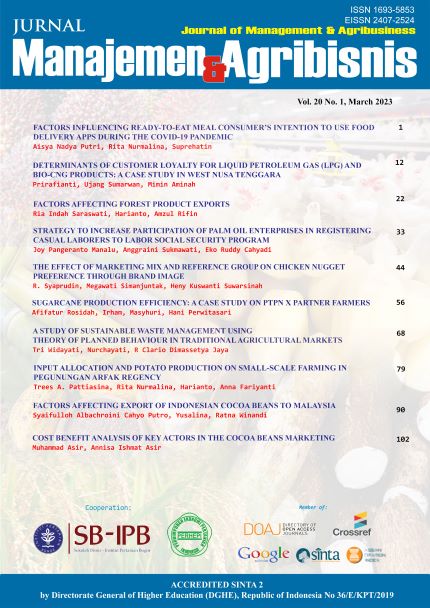Determinant of Farmers' Readiness Level and Their Strategies in Independent Palm Oil Plantations in Kapuas Hulu Regency
Abstract
The development of oil palm plantations in Indonesia is increasing because oil palm is one of the most important plantations in the economy of Indonesia. Sustainable management of oil palm is vital because it could reduce threats to natural resources, deforestation, expansion of land in ways that are not environmentally friendly such as by burning, and damage to peat ecosystems. The study aimed to determine farmers' readiness level in implementing ISPO certification for independent oil palm plantations in Kapuas Hulu Regency and to determine the right strategic priorities for managing independent oil palm plantations based on sustainable palm oil (ISPO) in Kapuas Hulu Regency. The data were analyzed descriptively with Analytical Hierarchy Process (AHP). The data was collected from 100 respondents taken by purposive sampling. The results show that overall the application level of compliance with laws and regulations is 24.8%, implementing good plantation practices is 31.33%, environmental management of natural resources and biodiversity is 42.5%, implementing transparency of 28.5%, and sustainably increasing business by 40%. Overall the average level of ISPO implementation achievement among the independent oil palm smallholders in Kapuas Hulu District is low, with a percentage of 30.8%. The optimal top priority for the strategy of independent oil palm plantations is mediation between conflicting parties, independent oil palm farmer groups, transparency regarding environmental impacts, extension agents in the plantation division and quality improvement of production.
Keywords: farmers' readiness level, palm oil, ISPO, independent smallholders, AHP
Authors
Authors who publish with this journal agree to the following terms:
- Authors retain copyright and grant the journal right of first publication with the work simultaneously licensed under a Creative Commons Attribution License that allows others to share the work with an acknowledgement of the work's authorship and initial publication in this journal.
- Authors are able to enter into separate, additional contractual arrangements for the non-exclusive distribution of the journal's published version of the work (e.g., post it to an institutional repository or publish it in a book), with an acknowledgement of its initial publication in this journal.
- Authors are permitted and encouraged to post their work online (e.g., in institutional repositories or on their website) prior to and during the submission process, as it can lead to productive exchanges, as well as earlier and greater citation of published work (See The Effect of Open Access).

